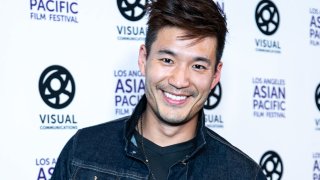
Kevin Kreider has spent his 14-year career hustling, first as a personal trainer and bodybuilder after graduating college, then moving from his hometown of Philadelphia to New York City to break into modeling and acting. The last few months in particular have been a whirlwind of new opportunities, following his debut as reality TV star in Netflix's flashy "Bling Empire" series, which follows a group of ultra-wealthy Asian Americans around Los Angeles.
Now, as the 37-year-old begins to film the show's second season, he says a steady lineup of projects (and paychecks) has granted him a lot more stability in his career. With that said, the entertainer says he had to learn how to deal with the sudden flush of opportunities from the advice of friends with a lot more experience building and managing their riches.
The 'Bling Empire' stars with the best career and money advice
Asked which castmates have given him the best financial advice, Kreider says real estate heir Kane Lim has taught him the most about how to negotiate projects and contracts.
Get South Florida local news, weather forecasts and entertainment stories to your inbox. Sign up for NBC South Florida newsletters.
Additionally, celebrity DJ Kim Lee has been a big help.
"She's been a working lady in entertainment for a long time," Kreider says. "Kim Lee comes from DJing and working as brand, so I value what she has to say in valuing yourself and your time."
Kreider admits he used to be of the mindset that he should be working 60 to 80 hours a week and take every opportunity that came his way. It certainly felt that way when he started his modeling and acting pursuits while living in New York City in the mid-2000s. He says he supplemented his creative bookings with catering and hosting jobs but still ended up racking up $26,000 in credit card debt to get by.
Money Report
Five years of working around the clock, along with other personal stressors, led him to experience stress-induced hair loss, which prompted him to seriously reevaluate his lifestyle.
Now, as a working creative and with the encouragement of his peers, he says he tries to prioritize his well-being and take on projects that are most meaningful to him, especially to stand out in a crowded entertainment market like LA. "To find my voice in a very noisy place in art and creativity ... it takes time and it takes energy. And I learned how to value my time and energy more."
At times, Kreider worries about his newfound success and the consequences of turning down new gigs. Overall, though, "it's the first time that I don't feel anxiety about what's going to happen in the future, because the future is really nicely laid out for a little while," he says, noting several brand opportunities on the horizon. "For the first time in my life, I have a choice to say 'no' to opportunities."
Weighing in on media representation
Some of the projects Kreider finds most fulfilling are ones that move the needle in increasing the representation of Asian American and Pacific Islanders, or AAPIs, in media. Over the years, he's taken part in a documentary and several keynote speeches about the portrayal of Asian American masculinity and mental health. These were issues he also wanted to bring up by taking part in "Bling Empire" as the stand-in for the regular viewer among his wealthy castmates.
Meanwhile, the show has received criticism as to whether it perpetuates the "crazy rich Asians" or model minority stereotype that all AAPIs are well-to-do and don't face any systemic barriers to success.
Kreider recognizes this but also points to the problem of "Bling Empire" being in limited company for Asian-led projects overall.
"As an Asian community, we expect one success to fix everything," Kreider says, and that it's "unfair to ask of production or talent to fix everybody's problems in one thing. We want to feel represented. And I agree with that, [but] a show like this may not represent every single person."
He says that throughout his career, he's put a lot of pressure on himself to represent AAPIs fully and "properly," but has also learned to come to terms that he can't be that face for everyone. He says he wishes more people recognized that, as the stand-in for the average viewer on the show, his storylines also serve as representation for Asian American adoptees to non-Asian families, and AAPIs still navigating the nuances of their identities in the U.S.
"What I've realized is I'll never be able to make everybody happy," Kreider says. "I can only do what I can do with my time and energy and platform. It's not going to be perfect, and I'm going to have to be OK with that now."
Combatting anti-Asian hate
Though Kreider says he's passionate about using his platform for good, he recognizes the limits of being a celebrity in addressing longstanding issues that have contributed to the recent rise in anti-Asian racism. But he's also had to come to terms and lean into his expanding public influence. In February, he faced criticism after posting on Instagram that he felt "self righteous" fans were pushing him to speak out on the rise of anti-Asian hate incidents at the time. He later apologized for the message and committed to doing more, such as by sharing resources like the news site NextShark and the Hate Is A Virus campaign.
Now, he sees his place as using his name and sway to lead individuals to the organizations doing the hard work of addressing racism. "There are organizations that commit their lives to this," Kreider says. "I've had conversations with leaders, and they said that it's best for us to lead the people to those organizations who have the right resources and are correct in their research and what's happening in the world. I find that it's best to spotlight those people that dedicate their time and resources full-time to [activism]."
In April, he and castmates Lim and Kelly Mi Li appeared in a music video to raise awareness, share resources, and raise funds for causes like Stop AAPI Hate.
Additionally, Kreider wants to encourage everyone to be a leader in their own community, whether that means having discussions with friends, parents teaching their kids about AAPI history and activism, or getting a few social media acquaintances to learn more about justice organizations.
"If each person did that," Kreider says, "it would be more impactful than even all the celebrities using their platforms to to raise this awareness."
Check out: How the model minority myth holds Asian Americans back at work—and what companies should do
Sign up now: Get smarter about your money and career with our weekly newsletter






